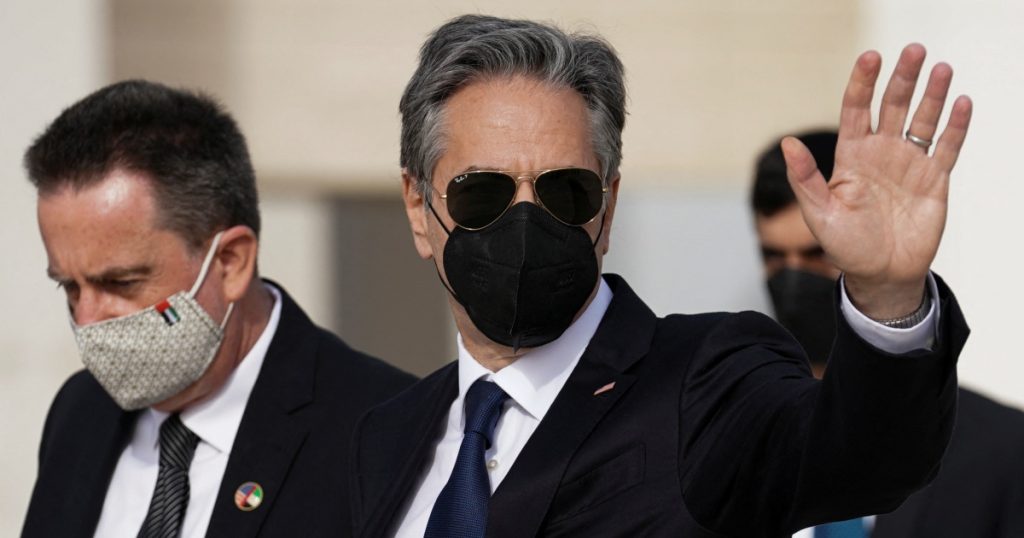An American delegation greets the new leader, Sheikh Mohammed bin Zayed Al Nahyan, after the death of President Sheikh Khalifa bin Zayed.
A high-level delegation including US Vice President Kamala Harris, Secretary of State Anthony Blinken, and senior military and intelligence officials traveled to the United Arab Emirates following the death of President Sheikh Khalifa bin Zayed Al Nahyan.
On Monday, senior US officials offered their condolences for the death of Sheikh Khalifa on Friday, and received the next president, Sheikh Mohammed bin Zayed Al Nahyan, who was elected by the Federal Supreme Council the next day.
And the US Vice President said in a statement after her meeting with Sheikh Mohammed bin Zayed, that Harris highlighted the “strength” of the partnership between the two countries, describing it as “enduring”, and said that she looks forward to the future of the relationship under the new leader. Al Nahyan.
The delegation’s robust roster underscores the continuing importance of a regional ally of the United States and appears to be an attempt by President Joe Biden’s administration to mend relations that have deteriorated in recent months.
Among those visiting the country are Harris, Blinken, Defense Secretary Lloyd Austin, CIA Director William Burns and climate envoy John Kerry.
“The United States takes very seriously the strength of our relationship and partnership with the UAE,” Harris told reporters before leaving on the trip.
US officials are expected to address long-running frustrations about US security protection in the Middle East as Washington has increasingly shifted its military hardware away from the volatile region of recent years and toward Russia and China.
The Emiratis were particularly frustrated with what they saw as the lack of strong US support following missile attacks in January by Yemen’s Houthis, who are allied with Iran, on Abu Dhabi.
Upon taking office, the Biden administration suspended the sale of billions of dollars of F-35 fighter jets to the UAE with the approval of former President Donald Trump. In a rare public admission in March, the UAE’s envoy to Washington acknowledged that the two countries were passing a “stress test”.
Sheikh Mohammed bin Zayed, who has largely been behind the scenes for years during his half-brother’s prolonged illness, was angered by the fact that Biden did not contact him quickly after the Houthi attacks or responded more forcefully to the Yemeni rebels, according to Reuters news agency. mentioned.
Tensions have also emerged over the UAE’s response to Russia’s invasion of Ukraine amid US pressure to avoid Moscow and pump more oil to improve stability in energy markets, as Europe tries to get rid of Russian crude.
Emirati officials have largely rejected US pressure to take a hard line against Russia, which remains a major trading partner.
Underlining the importance of the UAE to Western and Arab allies alike, a group of presidents and prime ministers headed to Abu Dhabi over the weekend to cement ties.
French President Emmanuel Macron and British Prime Minister Boris Johnson were the first European leaders to travel to the UAE capital since Sheikh Khalifa’s death.
Iran said Foreign Minister Hossein Amirollahian would also travel to the emirate on Monday.
While the US and Iranian visits may coincide, there is no plan for officials to meet face to face as world powers continue to negotiate a return to the 2015 Iran nuclear deal.




/cdn.vox-cdn.com/uploads/chorus_asset/file/25550621/voultar_snes2.jpg)


More Stories
Two children killed, 11 injured in stabbing attack at Taylor Swift dance party in UK, 17-year-old arrested
Fiber optic communications networks are being sabotaged – DW – 07/29/2024
Putin warns US against deploying long-range missiles in Germany | NATO